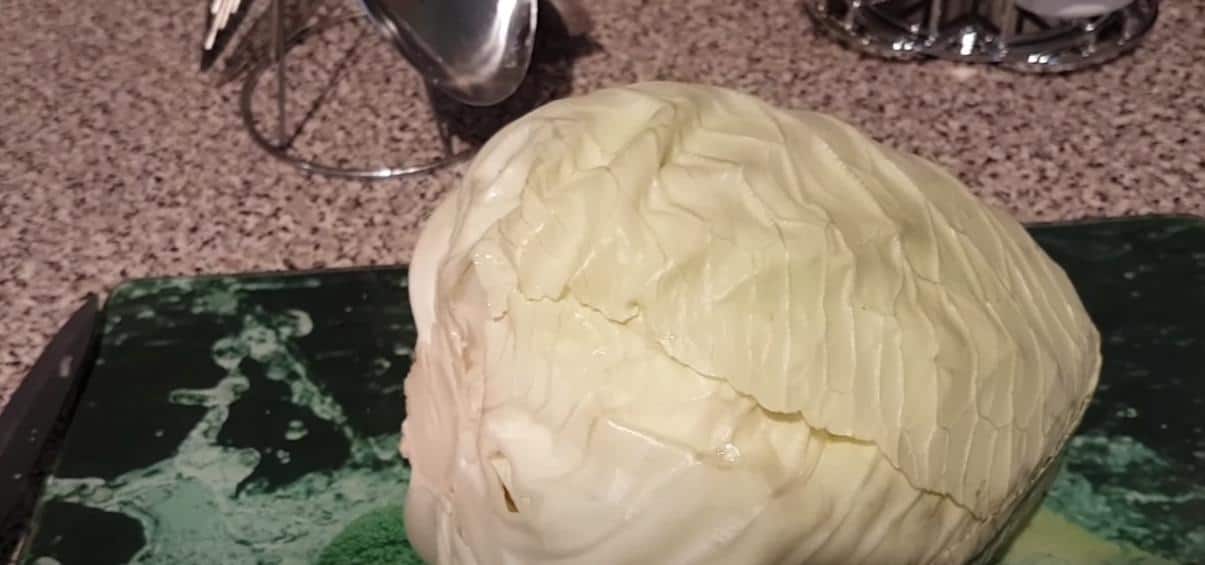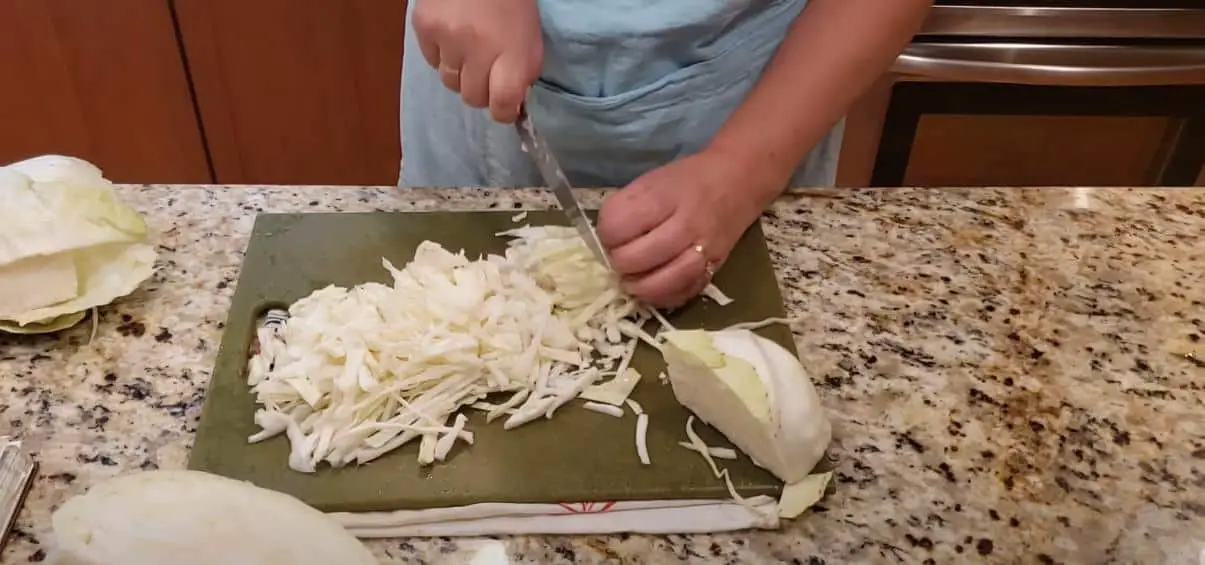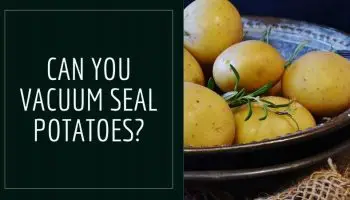Key Takeaways
- Yes, you can vacuum seal and freeze cabbage. This will help to keep it fresh for a longer period of time
- Vacuum sealing and freezing cabbage is a great way to preserve it so that you can enjoy it later
- Make sure to properly label and date the cabbage before freezing so that you know when it was sealed and frozen
Cabbage is a cruciferous vegetable that is often used in salads, slaws, and other dishes. Many people wonder if it is possible to vacuum seal and freeze cabbage.
This article will explore the topic of vacuum sealing and freezing cabbage.
You will learn about the benefits of this method and how long sealed cabbage will last in the freezer.
Additionally, you will discover whether or not every type of cruciferous vegetable needs to be blanched before being vacuum sealed.

How long will vacuum-sealed cabbage last?
Vacuum sealing and freezing cabbage is an excellent way to preserve the vegetable for a longer period of time.
Vacuum-sealed cabbage will last 3 to 5 times longer than unsealed cabbage, making it a great option for those who want to extend the shelf life of their produce.
When vacuum sealing and freezing cabbage, be sure to use a freezer-safe bag or container so that your food remains fresh and free from freezer burn.
Can cabbage be vacuum sealed and frozen?
Cabbage is a versatile vegetable that can be enjoyed in many different ways. One of its most popular uses is as a filling for sandwiches and wraps, but it can also be used in salads, soups, and stir-fries.
Cabbage is relatively easy to grow at home, and store-bought cabbage usually lasts for several weeks in the fridge. However, if you want your cabbage to last even longer, you can vacuum seal it and freeze it.
Vacuum-sealing cabbage is a great way to preserve it for later use. To safely vacuum seal cabbage, you need to blanch it first.
Blanching involves boiling the cabbage for a few minutes before shock cooling it in ice water. This process helps to kill any bacteria that may be present on the surface of the cabbage leaves.
Once the cabbage has been blanched, you can either freeze it raw or in a cooked state. If you plan on using the frozen cabbage within a few months, raw freezing is fine.
However, if you want to store the cabbage for longer periods of time, cooking it before freezing will help to preserve its flavor and texture better.
There are many different ways that you can cook frozen cabbage once thawed. One popular method is simply sautéing it with some butter or olive oil and garlic cloves until tender.
You can also add frozen chopped cabbage into soups or stews towards the end of cooking time since it doesn’t take long to thaw out and become tender when simmered in liquid dishes like these.
Can raw cabbage be vacuum sealed?
Raw cabbage can be vacuum sealed, but it must be blanched first in order to preserve its quality and prevent spoilage.
Cabbage emits gas when refrigerated, but not when frozen, so it is best to seal it while it is still fresh.
Can you vacuum-seal cabbage without blanching?
You can vacuum seal cabbage without blanching it, which is a common method of preserving the vegetable. This means that you can store the cabbage in your freezer for an extended period of time without fear of it going bad.
In addition, vacuum sealing will prevent freezer burn and keep the cabbage fresh-tasting.
Is it better to freeze cooked or raw cabbage?
When it comes to preserving cabbage, both raw and cooked options have their pros and cons.
Ultimately, the best method for freezing cabbage depends on how you plan to use it later. If you anticipate using your frozen cabbage in recipes that call for cooked ingredients, then boiling or steaming the cabbage first will give you the best results.
Cooked cabbage freezes well and can be added directly into soups or stews without thawing beforehand.
On the other hand, if you want to maintain the crunchy texture of raw cabbage, then freezing it raw is your best bet.
Raw frozen cabbage can be used in salads or coleslaws, or even sauteed as a side dish.
No matter which method you choose, vacuum sealing your cabbages before freezing them will help keep them fresh for longer periods of time.
How do I blanch cabbage for freezing?
When it comes to preserving cabbage, there are two main methods: vacuum sealing and freezing. Each has its own advantages and disadvantages, so it’s important to choose the right one for your needs.
Vacuum sealing is a great option if you need to preserve cabbage for a long period of time. Cabbage will stay fresh in a vacuum-sealed bag for up to 2 years. However, vacuum sealing is a more expensive option than freezing, and it requires special equipment.
Freezing is the most common method of preserving cabbage. It’s quick and easy, and you don’t need any special equipment. frozen cabbage will keep for up to 1 year. However, frozen cabbage can lose some of its flavor and texture over time.
What are the benefits of freezing cabbage vs fresh?
When it comes to preserving the nutritional value and extending the shelf life of cabbage, freezing is definitely the way to go.
Vacuum sealing cabbage before freezing it can help preserve even more of its nutrients and keep it fresh for up to 9 months.
Some of the other benefits of vacuum sealing and freezing cabbage include how easy it is to prepare and how long it lasts in the freezer.
Will thawed, frozen cabbage still be good to eat?
If you’re like most people, you probably have a stash of frozen vegetables in your freezer. And while frozen vegetables are a convenient and healthy option, sometimes you may find yourself wondering if they’re still good to eat after being thawed.
Take cabbage for example. If you thaw out frozen cabbage, it will still be safe to eat. However, it may not be as fresh-tasting as if you had cooked it fresh. That’s because when vegetables are frozen, their cell walls break down and release moisture. This can make them taste less crisp and flavorful when they’re thawed.
One way to help preserve the quality of your frozen vegetables is to vacuum seal them before freezing. Vacuum sealing helps remove air from around the food, which can cause freezer burn and affect the taste of the food over time. Plus, vacuum-sealed foods take up less space in your freezer so you can fit more in!
So next time you’re wondering if that bag of frozen cabbage is still good to eat, go ahead and give it a try – just know that it might not taste as great as fresher cabbage would.

How can I use frozen, vacuum sealed cabbage in recipes
If you’re looking to add some extra nutrition to your diet, consider using frozen, vacuum-sealed cabbage in recipes.
Cabbage is a cruciferous vegetable, and like broccoli and other cruciferous vegetables, it contains nutrients that can boost your health.
However, before you vacuum seal and freeze cabbage, you need to blanch it first. Blanching helps preserve the nutrients in the cabbage and prevents the formation of off-flavors.
To blanch cabbage, simply cook it in boiling water for two minutes before cooling it quickly in ice water.
Then, vacuum seal the cabbage and store it in the freezer. When you’re ready to use it, thaw the cabbage in the refrigerator overnight before adding it to your recipe.
Final Verdict
Cabbage is a versatile vegetable that can be enjoyed cooked or raw. If you’re looking to extend its shelf life, vacuum sealing and freezing cabbage is a great option.
However, blanching it first will help preserve its texture and flavor. You can freeze both raw and cooked cabbage, but for easy thawing and use, cut it into smaller pieces before freezing.



![Can You Vacuum Seal Tomatoes? [The Proper Way!]](https://vacuumsealerzone.com/wp-content/uploads/2021/08/Can-You-Vacuum-Seal-Tomatoes-350x200.jpg)